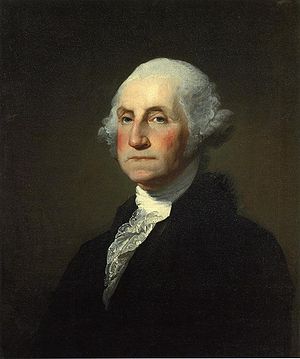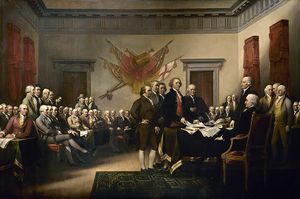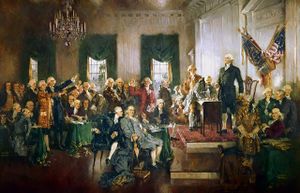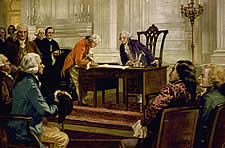Founding Fathers
 From Conservapedia
From Conservapedia 
The Founding Fathers are the leaders who founded the United States, especially the 40 dignitaries who signed the U.S. Constitution at the Constitutional Convention of 1787, and the 57 signers of the Declaration of Independence. Historians consider the most important founders to include John Adams, Samuel Adams, Benjamin Franklin, Alexander Hamilton, Thomas Jefferson, James Madison, and George Washington. Washington is known for his leadership and honesty; Hamilton for his brilliance; John Adams for his morality; Franklin for his inventiveness; Madison for his scholarship; and Jefferson for his egalitarianism.
The 55 initial participants—all of whom would be considered "Founders" in the broad sense of the term—wrote 15,000 articles, books and other materials. A study found that the Bible comprised 34% of their direct quotations. They particularly liked quoting the Book of Deuteronomy.[1]
The last surviving member of the signers of the Declaration was Charles Carroll of Carrollton, and the last surviving Founding Father was James Madison.[2][3]
Contents
Views[edit]
The overall philosophy of the founding fathers can be summarized as "Americanism."
Freedom and natural law[edit]
The founding fathers were heavily influenced by John Locke, who promoted the principles of individual freedom and a limited government based on natural law and unalienable rights, as advocated by John Locke.[4][5] The founding fathers themselves strongly supported these principles.[6][7] Their experience with the tyrannical British government made them distrustful of a powerful government, and their resolve to not repeat this experience is reflected in the U.S. Constitution and Bill of Rights.[8] For example, the Constitution goes to great lengths to mandate the separation of powers, and the Bill of Rights further limits government power to protect individual rights.[8][9][10][11][12][13] The founders also emphasized the importance of property rights.[6][14] Many of the founding fathers warned Americans to stay vigilant against trends that erode individual freedom, including the growth of bureaucracy, violation of the separation of powers, and judicial supremacy.[15]
Views on Slavery[edit]
With the understanding that Liberty is the gift of God, the Founding Fathers well understood that slavery was morally wrong despite facing the question of what could practically be done against it.[16] In many instances however, the Founders recognized that slavery which was brought here by the British Empire could not be eliminated immediately without risking the cohesion between the Thirteen Colonies. Without this cohesion, the Founders feared, all would be hung.[17] When America declared Independence, Franklin's Join or Die captured this sentiment in a very powerful way. Thirteen years later at the Constitutional Convention, James Madison expressed his concern that "the greatest danger is that of disunion of the States",[18] making it clear that for more than a decade nothing scared the Founding generation more than the might of a known superpower where the sun never set.
In private correspondence as well as major acts or events, the Founders wrote of Britain's role, such as in the Original "rough draught" of the Declaration of Independence; the topic of the British government's role in slavery came up in discussion at the Constitutional Convention,[19] and several founders such as Thomas Paine and Benjamin Rush published pamphlets decrying the practice.[20]
Not wanting to build a government with a single figure as powerful as a king, the Founders sought a Republican form. As a republican form, all domestic issues are decided on a state level, which included the issue of slavery. As early as 1780, the Founding generation succeeded in abolishing slavery. Pennsylvania was the first state to abolish it, followed by Massachusetts in 1783 and Rhode Island and Connecticut in 1784. Other states would continue to follow suit in years to come.
The famous Northwest Ordinance specifically forbid slavery.
Republicanism[edit]
The Founding Fathers sought "Honor"—freedom from corruption, and a positive devotion to civic virtue. These were key elements of Republicanism, and the Founding Fathers made republicanism the core values of the American system of government.
Corruption was the great evil the Founding Fathers confronted. When Britain showed too much corruption, it was time to break free with the American Revolution. To overcome the temptations of corruption—such as luxury and bribery—in their own lives, the Founding Fathers cultivated the virtue of disinterestedness. That is, the made a conscious effort to not be the creature of his financial interests, and not give any sign to the public that they sought luxury or bribes. The goal was to be impartial, concerned only for the public good, not the advancement of friends or, still less, of party.
Even personal shame and humiliation was preferable to a tarnished honor or the hint of corruption. When Treasury Secretary Alexander Hamilton was accused of corruption for making secret payments to a man named James Reynolds, Hamilton revealed he had been set up and was paying blackmail to Reynolds following an affair with Mrs. Reynolds. Duels over honor were common in the era—Hamilton was killed in one, as was Hamilton's son.
Sovereignty[edit]
The Founding Fathers cared deeply about preserving national sovereignty, since a sovereign U.S. government would serve the American people alone and protect their unalienable rights, and let them govern themselves.[21] In fact, they chose to declare independence because Britain was not respecting their right to self-government.[21] For example, in his farewell address in September 1796, George Washington warned his fellow Americans against becoming entangled in international treaties and alliances, as he knew it would end American freedom.[22][23] In addition to Washington, Gouverneur Morris criticized "Citizens of the World" at the Constitutional Convention in 1787 and called for constitutional restrictions on foreigners such as a ban on holding office.[24]
Federalism and separation of powers[edit]
The founding fathers strongly supported the principles of federalism and the separation of powers to ensure a limited government.[10][25][26]
Religion[edit]
The founding fathers did not discuss or advocate for a "separation of church and state."[27] They were religiously and theologically diverse, coming from several denominational backgrounds.[28] Their actual beliefs and practices are debated, but here too, they were diverse and must not be generalized.[29] Some argue that the majority of the founding fathers were deists,[28] while others argue that the most important fathers were "theistic rationalists," meaning they were not deists, but not necessarily Christians either.[29] Despite this, scholars agree that some founding fathers were orthodox Christians.[28][29] The founding fathers that were not Christians were influenced by Christianity in a culture where publicly being a Christian was normal.[29]
The founding fathers considered to be "theistic rationalists" did believe God was active in earthly affairs and that religion was essentially important to society because it brought morality.[29] However, they believed this to be true for all religions, rather than just Christianity.[29] They opposed the establishment of an official religion but supported religion in public life.[29]
In a Judiciary Committee report published by the House of Representatives in 1854 titled "Chaplains in Congress and in the Army and Navy" it was noted that:
- In this age, there can be no substitute for Christianity; that, in its general principles, is the great conservative element on which we must rely for the purity and permanence of free institutions. That was the religion of the founders of the republic, and they expected it to remain the religion of their descendants.[30]
Signatories of the Declaration of Independence[edit]

|
14.Lyman Hall 15.John Hancock 17.John Hart 18.Joseph Hewes 32.Lewis Morris 35.John Morton 37.William Paca 38.John Penn 40.George Read 42.George Ross 46.James Smith 48.Thomas Stone 54.James Wilson 57.George Wythe |
Signatories of the Articles of Confederation[edit]
|
|
|
Other Founding Fathers[edit]
==religious list of the singers of the us founding fathers from the articles of confederation the constitution and the declaration of indepence
A Table of the Religious Affiliations
of American Founders
Signer State Doc. Office Affiliation (Ref.)
Adams, Andrew CT A CO(l) Adams, John MA D President CO(b)UN(a) Adams, Samuel MA D/A CO(b) Adams, Thomas VA A Banister, John VA A Baldwin, Abraham GA C CO(j,k)PR(n) Bartlett, Josiah NH D/A CO(b) Bassett, Richard DE C ME(g,j,m,n) Bedford, Gunning, Jun. DE C PR(j,m) Blair, John VA C Justice PR(a)EP(n) Blount, William NC C EP(n)PR(f,j) Braxton, Carter VA D Brearly, David NJ C EP(n) Broom, Jacob DE C QU(n)EP(m) Butler, Pierce SC C EP(j,m) Carroll, Charles MD D RC(d) Carroll, Daniel MD A/C RC(d,j,n) Chase, Samuel MD D Justice EP(a) Clark, Abraham NJ D PR(c,e) Clingan, William PA A Collins, John RI A Governor Clymer, George PA D/C QU(j,n),EP(j) Dana, Francis MA A Dayton, Jonothan NJ C PR(n)EP(j) Dickenson, John DE A/C QU(j,m,n)EP(j) Drayton, William Henry SC A Duane, James NY A EP(l) Duer, William NY A Ellery, William RI(A)MA(D) D/A CO(b) Few, William GA C ME(j,k,n) Fitzsimons, Thomas PA C RC(j,n) (variant spellings: Fitzsimmons, Fitz-Simons) Floyd, William NY D PR(c,e) Franklin, Benjamin PA D/C EP(n)DE(j) Gerry, Elbridge MA D/A EP(j) Gilman, Nicholas NH C CO(j,n) Gorham, Nathaniel MA C CO(j,n) Gwynnett, Button SC D EP(k,o) Hall, Lyman SC D CO(b,k) Hamilton, Alexander NY C EP(j,n) Hancock, John MA A/D CO(b) Hanson, John MD A Harnett, Cornelious NC A EP(f)DE(f) Harrison, Benjamin VA D Governor Hart, John NJ D PR(c) Harvie, John VA A Hewes, Joseph NC D EP?(f) Heyward, Thomas SC A Heyward, Thomas, Jr. SC D Holton, Samuel MA A Hooper, William NC D EP(f) Hopkins, Stephen RI D Hopkinson, Francis NJ D Ep(l) Hosmer, Titus CT D Huntington, Samuel CT D/A CO(b) Hutson, Richard SC A PR(l) Ingersoll, Jared PA C PR(j,n) Jefferson, Thomas VA D President DE(a) Jennifer, Dan oF St. Thomas MD C EP(j,n) Johnson, Wm. Saml. CT C Justice PR(a)EP(j,n) King, Rufas MA C EP(j)CO(n) Langdon, John NH C CO(j,n) Langworthy, Edward GA A EP(o) Laurens, Henry SC A HU(l) Lee, Henry Lightfoot VA D/A Lee, Richard Henry VA D/A Senator Lewis, Francis NY D/A Livingston, Phil. NY D P(c) Livingston, Wil. NJ C PR(j,n) Lovell, James MA A Lynch, Thomas Junr. SC D Madison, James Jr. VA C President EP(a,j,n)TH(i) Marchant, Henry RI A Mathews, John SC A McHenry, James MD C PR(j,n) Middleton, Arthur SC D Miflin, Thomas PA C QU(n)LU(j) M'Kean, Thomas DE D/A PR(m) Morris, Gouv. NY(A)PA(C) A/C EP(j)DE(i,n) Morris, Lewis NY D Morris, Robert PA D/A/C EP(j,n) Morton, John PA D Nelson, Thomas Jr. VA D Paca, William MD D Paine, Robert Treat MA D CO(b) Paterson, William NJ C Justice PT(a)PR(j,n) Penn, John NC D/A UK(f) Pinckney, Charles SC C EP(j,n) Pinckney, Chas. Cotesworth SC C EP(j,n) Read, George DE D/C EP(j,m,n) Reed, Joseph PA A Roberdeau, Daniel PA A Rodney, Caesar DE D EP(m) Ross, George PA D Rush, Benjamin PA D PR(c,e)UN Rutledge, Edward SC D Justice CE(a) Rutledge, J. SC C EP(j,n) Scudder, Nathaniel NJ A Sherman, Roger CT D/A/C CO(b,j,n) Smith, James PA D PR(c,e) Smith, Jona. Bayard PA A Spaight, Richard Dobbs NC C EP(f,j,n) Stockton, Richard NJ D PR(c,e) Stone, Thomas MD D Taylor, George PA D PR(c,e) Telfair, Edward GA A Thornton, Matthew NH D PR(c,e) Van Dyke, Nicholas DE A EP(m) Walton, George GA D AN(o) Walton, Jno. GA A Washington, George VA C President EP(a,j,n)TH(i) Wentworth, John Junr. NH A Whipple, William NH D CO(b) Williams, Jonothan NC A UK(f) Williams, William CT D CO(b) Williamson, Hu NC C PR(f,n)DE(j) Wilson, James PA D/C Ch. Justice* EP(a)PR(e,n)DE(j) Witherspoon, Jonothan NJ D/A Minister PR(c)(e) Wolcott, Oliver CT D/A CO(b) Wythe, George VA D EP(j)
Further reading[edit]
- Ellis, Joseph J. Founding Brothers: The Revolutionary Generation (2002), good overview of leading figures by top scholar excerpt and text search
- McClanahan, Brion. The Politically Incorrect Guide to the Founding Fathers (2009), popular book by conservative writer. excerpt and text search
- Wood, Gordon. Revolutionary Characters: What Made the Founders Different (2007), very good overview by leading conservative scholar excerpt and text search
See also[edit]
- Founding Fathers quotes that mention God
- Gallery of American Heroes
- David Ramsay
- Hero: Gallery of American Heroes
- Memorial Day, Veterans Day, Remembrance Day
- Vow
References[edit]
- ↑ https://juicyecumenism.com/2017/05/26/bibles-significance-american-founders/
- ↑ Virginia's Historic Homes and Gardens
- ↑ The American Presidents, Washington to Tyler
- ↑ 2. Foundations of American Government. USHistory.org. Retrieved August 24, 2019.
- ↑ The Declaration of Independence and Natural Rights. Constitutional Rights Foundation. Retrieved August 24, 2019.
- ↑ 6.0 6.1 Founders’ Quotes on Founding Principles. Bill of Rights Institute. Retrieved August 24, 2019.
- ↑ Bleau, Hannah (July 4, 2019). 13 Patriotic Quotes from America’s Founding Fathers. Breitbart News. Retrieved July 4, 2019.
- ↑ 8.0 8.1 Best, James D. The Founders Believed in Limited Government. What Would the Founders Think. Retrieved August 24, 2019.
- ↑ Pilon, Roger (July 21, 1995). Founders Intended Only Limited Powers. CATO Institute (from USA Today). Retrieved August 24, 2019.
- ↑ 10.0 10.1 3a. The Founders and Federalism. USHistory.org. Retrieved August 24, 2019.
- ↑ Beeman, Richard R. The Constitutional Convention of 1787: A Revolution in Government. Constitution Center. Retrieved August 24, 2019.
- ↑ 2c. Creating the Constitution. USHistory.org. Retrieved August 24, 2019.
- ↑ 2d. The Bill of Rights. USHistory.org. Retrieved August 24, 2019.
- ↑ Snowball, Timothy (July 11, 2019). The Founding Fathers of our limited government: George Washington and the importance of property rights. Pacific Legal Foundation. Retrieved August 24, 2019.
- ↑ Strong Warnings from the Founders. National Center for Constitutional Studies. Retrieved August 24, 2019.
- ↑ Madden, Nate (December 31, 2019). Pete Buttigieg once said that the framers of the Constitution ‘did not understand that slavery was a bad thing.’ Here’s a reality check. Conservative Review. Retrieved December 31, 2019.
- ↑ "We must, indeed, all hang together or, most assuredly, we shall all hang separately", Benjamin Franklin
- ↑ Madison Debates - August 23
- ↑ Madison Debates - August 22, Col. Mason: This infernal traffic originated in the avarice of British Merchants. The British Govt constantly checked the attempts of Virginia to put a stop to it.
- ↑ An Address to the inhabitants of the British Settlements on the Slavery of the Negroes in America, by Benjamin Rush
- ↑ 21.0 21.1 Groves, Steven (December 3, 2010). Why Does Sovereignty Matter to America? The Heritage Foundation. Retrieved November 27, 2017.
- ↑ Washington's Farewell Address 1796. The Avalon Project -- Yale Law School. Retrieved November 27, 2017.
- ↑ Washington's Farewell Address. Government Publishing Office. Retrieved November 27, 2017.
- ↑ Madison Debates – Tuesday August 9, 1787. The Avalon Project. Retrieved December 8, 2018.
- ↑ Byas, Steve (December 10, 2019). What Happened to Federalism? The New American. Retrieved December 30, 2019.
- ↑ Green, Mark (December 29, 2019). Rep. Mark Green: Want to save America? Embracing this gift from the Founders is the only way. Fox News. Retrieved December 30, 2019.
- ↑ Dinan, Stephen; Swoyer, Alex (January 2, 2020). Founding fathers never discussed wall of separation between church and state. The Washington Times. Retrieved January 4, 2020.
- ↑ 28.0 28.1 28.2 David L. Holmes. The Founding Fathers, Deism, and Christianity. Encyclopædia Britannica. Retrieved May 22, 2017.
- ↑ 29.0 29.1 29.2 29.3 29.4 29.5 29.6 Dr. Greg Frazer. The Faith of the Founding Fathers. The Master's University. Retrieved May 22, 2017.
- ↑ Reports of Committees - 16th Congress, 1st Session - 49th Congress, 1st Session, 1854, H. Rep. 124, 33rd Congress, 1st Session
External links[edit]
- The National Archives
- The National Archives - Historical Documents
- The Patriot Post - Historical Documents
- The Constitution from the National Archives
- The Constitution of the United States of America
- Anti-slavery in America from the Introduction of African Slaves to the Prohibition of the Slave Trade (1619-1808), by Mary Stoughton Locke, 1901
- Works by the Founding Fathers of the United States - text and free audio - LibriVox
- AMERICAN LEADERS AND HEROES, A PRELIMINARY TEXT-BOOK IN UNITED STATES HISTORY BY WILBUR F. GORDY, Project Gutenberg
Founding Fathers Quotes[edit]
- Mark's Quotes: Founding Fathers Quotes
- USDOJ & Government Watch: Spirit of America Liberty Quotes
- Eads Home Ministries: Founding Fathers Quotes
religious affilaitons[edit]
https://candst.tripod.com/tnppage/qtable.htm
| ||||||||||||||
| |||||||||||
| ||||||||
| |||||||||||||||||||||||||||||||||||||||||||||||||||
Categories: [Founding Fathers] [Republicanism] [Conservatives] [Pro Second Amendment] [People Associated with Firearms] [American Gun Rights Advocates] [United States History Figures] [Patriots]
↧ Download as ZWI file | Last modified: 02/23/2023 13:56:34 | 70 views
☰ Source: https://www.conservapedia.com/Founding_Fathers | License: CC BY-SA 3.0
 ZWI signed:
ZWI signed:

 KSF
KSF